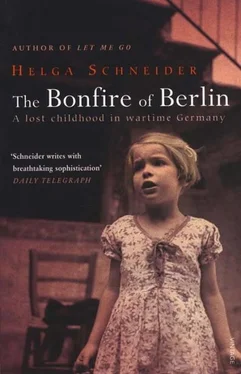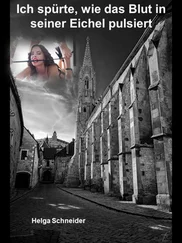‘It’s not true!’ I cried, shaking with humiliation. ‘My father is a famous General!’
‘He’s in the anti-aircraft division, I tell you!’ she shrieked, red with fury.
‘He’s a General!’
Then she started to slap me in front of Frau Gerlinde, repeating that I was just like my mother. Finally she sent me to the study with the peremptory declaration ‘No dinner for you tonight!’
There was one other thing she couldn’t bear; the fact that, at the age of five, I was still sucking my thumb. She tried everything she could think of to break my habit: sprinkling my finger with salt, then with perfume, then with turpentine, half a bottle of which she had found in my father’s studio. Having run out of unpleasant concoctions, she took to striking my thumb with a variety of objects: wooden spoons, a letter-opener, the handle of the carpet-beater.
One day she struck me so violently that I almost fainted from the pain, but instead I bit her on the wrist and fled to the bathroom and locked myself in. She started knocking furiously at the door, threatening me with a variety of punishments if I didn’t open up straight away, but I refused to do so, fearing that she might kill me. Crouching under the window, I waited to see what would happen.
Ursula went on knocking and threatening but in the end was obliged to call someone to force the door. I heard a lot of fussing around the lock until it gave and my stepmother burst in like a Fury. She grabbed me by the hair and hit me in front of the person who had helped her to open the door, a bent and emaciated old man with a bald head who gave me an awkward smile of solidarity.
When the old man had gone, Ursula dispatched me to the study as usual, with a series of kicks to the bottom, denying me, as she always did, my food ration. Towards evening, by now crazed with hunger, I became enraged. I started to search for something on which I could vent my rage. Finally my eye fell on some little tubes of paint lined up on a small wicker table; at the same time I noticed a canvas on an easel. It showed an interior with a bowl full of apples, pears, grapes and other fruits with which I was unfamiliar.
I picked up a tube, unscrewed the cap and, with my fingers, smeared the entire contents over the canvas, obliterating pears, apples, grapes and exotic fruits and reducing the whole thing to formless, dark brown mud. When my stepmother saw the destruction, she nearly strangled me. She broke a coat-hanger over my bare bottom and shouted, ‘What else could anyone expect of the daughter of a Nazi whore?’
She shouldn’t have said that! From that day onwards, our relationship became one of open hostility. I began to think about how I could avenge myself.
One morning Ursula went out shopping: someone had said there was more to buy than usual, including potatoes and molasses. She left Peter and me in the care of Frau Gerlinde.
Frau Gerlinde was a young woman, sweet and kind,whose husband was also at the front; they had no children.
She sat down on the sofa in the drawing room and started to read us a fairy-tale; Peter listened wide-eyed. But in the middle of a scene between the wicked witch and some innocent creature or other, I announced that I had to go to the bathroom. Frau Gerlinde nodded and smiled, though Peter was furious with me for ruining the suspense. I left the room, but rather than going to the bathroom I slipped into Ursula’s bedroom and started rummaging in the chest of drawers. I found something very interesting.
It was a pile of letters tied with a red ribbon; I guessed immediately that these were letters my father had written to Ursula from the front. Hiding the packet in my knickers, I slipped into the bathroom. I had to act quickly because my stepmother had taken to hiding the key after I’d locked myself in. I quickly tore the letters to bits, threw the pieces into the toilet-bowl and pulled the chain. I got back to the drawing room just in time to enjoy the end of the fairy-tale.
My stepmother discovered the crime a few days later and didn’t think for as much as a moment that it might have been Peter. She beat me mercilessly with another coat-hanger, which, as usual, broke in two. Then she sent me to my father’s study, where she tied my arms to a chair. I stayed there all day in the dark, without anything to eat. When, towards evening, she finally untied me, I fainted at her feet.
When I came to my senses, I was lying on the sofa in the drawing room. Ursula was looking at me in silence. Her young face was irritated, almost threatening. I saw it in the faint halo of light coming from a standard lamp; her eyes were cold.
‘How do you feel?’ she asked finally, without a hint of tenderness.
‘Fine,’ I murmured. The memory emerged slowly: my father’s study, the darkness, the chair, the ropes.
‘Can you get up?’
I jumped from the sofa so quickly that my eyes clouded over. I swayed back and forth.
‘Gently, young lady,’ she said. ‘You’re laying it on as you always do!’ And she pushed me into a chair. ‘I’ll be back in a minute,’ she added, and left the room. I remained with Peter, who pressed me with questions. ‘Why did you fall? Why did Mutti carry you to the sofa! Why has Mutti gone out! Why don’t you get up?’
My stepmother returned with a cup of something that was supposed to be milk but was really just a plastery broth made from a strange powder and not even sweetened.
‘Drink!’
I shook my head.
‘Drink!’ she repeated impatiently. So I gulped down the disgusting potion with Peter aping my grimaces.
After a while, my stepmother announced, ‘I have something to say to you, Helga.’
I looked at her, trying to guess what she was about to tell me.
‘We can’t go on like this,’ she began. ‘I’m not going to put up with it any longer. You’re forcing me to send you away to boarding school.’
Peter piped up, ‘Me too bo’ding school! Me too!’
‘You’re staying with Mutti,’ Ursula hushed him. ‘You’re a good boy.’ At which, flattered, he half-dosed his eyes.
My stepmother stared at me and waited for my reply, which didn’t come. ‘Don’t you have anything to say?’ she asked, rather startled.
‘No.’
‘Then you don’t mind if I send you to boarding school?’ she persisted, unsettled by my indifference. ‘No.’
A perplexed expression flickered across her face. ‘Do you understand what I’m telling you?’
I nodded.
Ive decided to send you to boarding school! Because you’re rebellious, stubborn and…’ But the rest of her words were drowned out by sirens. ‘Not again!’ she exclaimed. We ran to the cellar.
The general situation was getting worse. We were always hungry and frequently went to bed without supper. Rationing didn’t cover even the most basic requirements. But in spite of the fact that we were seriously malnourished, Peter kept his round cherub’s face. He was a truly beautiful child: blond curls, delicate features, big blue eyes; who could have resisted him? As for me, God had seen fit to give me hair straight as wires and eyes that were no match for Peter’s.
One morning Ursula dealt me another severe blow. In the street we had met some of her friends who worked for a military hospital, and she had calmly introduced Peter as her son and me as her stepdaughter. That convinced me once and for all that she had accepted him and not me. I was a mere appendage, and an ungrateful one at that. I felt alone and unwanted, and only wished to die.
One afternoon◦– we had just got back from the shelter after a severe air-raid◦– my stepmother went to ask Frau Gerlinde if she could borrow something. Seized by a sudden impulse, I crept through our front door, went down the stairs and slipped into the courtyard. This was one of those typical Berlin courtyards you find inside big blocks of flats, dense with vegetation.
Читать дальше












